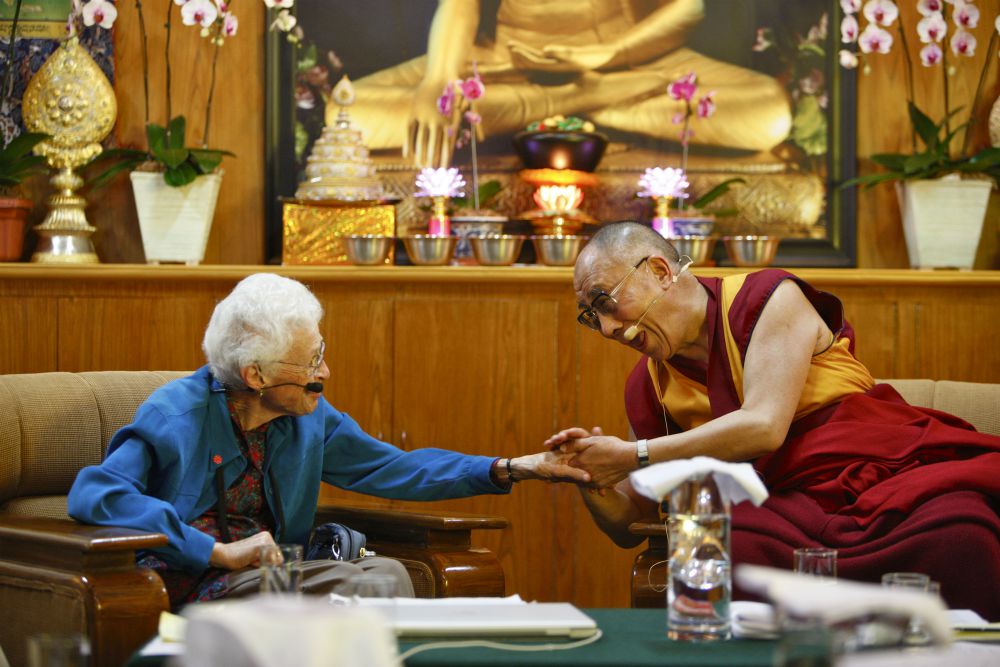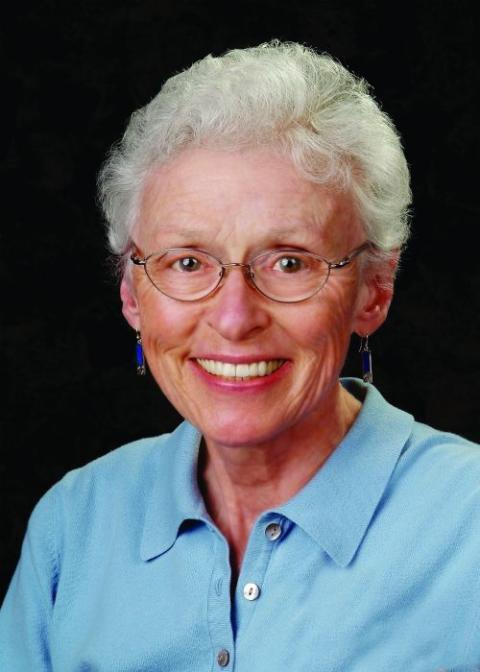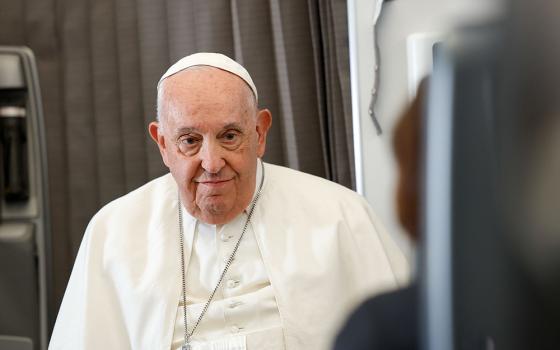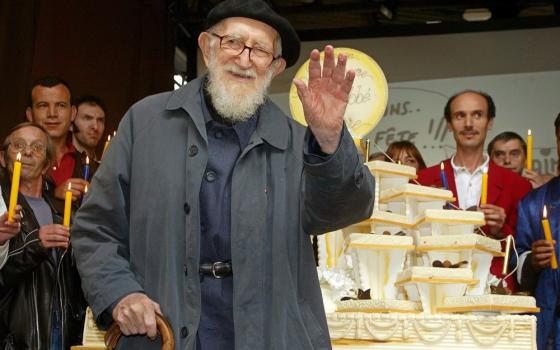
Eco-feminist theologian Sallie McFague greets the Dalai Lama during his conference on ecology, ethics and interdependence in 2011. (Courtesy of McFague family)
Introduction: Sallie McFague was not Catholic, but her work in eco-feminist theology influenced generations of Catholic theologians and students. I read Models of God and The Body of God in graduate school, and they still sit on my bookshelves. Both books profoundly changed how I imagined God and God's relationship to the natural world, sparking alternative models for the Divine and ones that highlight care for the planet.
McFague, who spent much of her professional life at Vanderbilt Divinity School, died Nov. 15 in Vancouver, British Columbia, where she had been distinguished theologian in residence at the Vancouver School of Theology since 2000. She was 86.
Born in Quincy, Massachusetts, McFague graduated magna cum laude from Smith College in 1955 with a bachelor of arts in English literature. She earned bachelor's, master's and doctoral degrees in divinity and theology from Yale University, and began teaching at Vanderbilt Divinity School in 1970. When she was named dean of the divinity school in 1975, news reports said she was the first woman to hold such a position in the United States. She returned to teaching full-time in 1980 and retired as professor emerita in 2000.
Franciscan Sr. Shannon Schrein, who studied McFague and wrote her doctoral dissertation about McFague's work, has shared this appreciation for McFague's life and work.
—Heidi Schlumpf
There are important moments in life when an encounter with someone or something changes your way of thinking. I experienced just such an encounter when I was a graduate student at Marquette University and I first came across the theology of Sallie McFague. Her death last month evoked a flood of memories related to my first experience with her work. It also reminded me of many hours of study and reading her books, for she soon became a prime focus of my dissertation.

Sallie McFague, whose work inspired new models of God that emphasized care for creation, died Nov. 15 at the age of 86. (Courtesy of McFague family)
Though I never met McFague, I had the pleasure of hearing her respond to her teacher and mentor Gordon Kaufman. Kaufman was discussing his understanding of God as the serendipitous, evolutionary trajectory. Sallie told him that while it was a fascinating way to think about God, "It would never preach." Her wit and humor was infectious and gave evidence of the great joy she experienced when engaged in theological dialogue.
McFague once wrote an essay in which she identified her theological contribution to the planetary agenda as "a square in the quilt." Her work as a theologian provides a vision of the intricacies of pattern, fabric and stitch that comprise the square she has created and added to the rich design of theology. Creating a quilt, even a single square, requires designing a pattern, selecting the colors, considering its relation to the whole and then painstakingly adding every stich. This is an apt metaphor, not only for McFague's methodology, but for her life's work.
In her early work, she explored the significance of metaphor for doing theology. Language functions, and as such, plays a significant role in doing theology. McFague's use of metaphor and her belief that all theology is necessarily metaphorical drew me into what would ultimately be a rich conversation with her writings.
The work of theology is "the elaboration of key metaphors and models," she wrote in her award-winning book Models of God: Theology for an Ecological, Nuclear Age. New metaphors are required to give substance to new ways of conceiving God.
The power of metaphor, when talking about God, is found in the flash of discovery, a moment that offers a different way of thinking about God. Suddenly the traditional image of God as father, for example, is recognized as no longer sufficient for our time.
With the use of new metaphors, old idols are destroyed and new and hopefully transformative images take their place. Overused metaphors, especially those that have become reified over time, lose their ability to speak, to move, to change and to transform us. McFague understood that the immensity of God demands that no single image is sufficient for understanding God's grandeur.
In Models of God, McFague explores a Trinitarian revolution of sorts, considering God as mother, lover and friend. Some might call this a radical theology that is constructive, relevant and perhaps even disturbing. It shatters the more traditional view of God as father, son and spirit and invites Christians to break open these new ways of thinking about God and God's relationship to the world. This was McFague's legacy. Her approach to doing theology highlighted imaginative and eye-opening ways of conceiving God's action in the world.
In every case, McFague took the questions that arise in her research and reflection to the next level. Her work demonstrates the growth and expanding vision of a true theologian who seeks truth in her relationship with God and the world. Her style bears a humble acknowledgement that understanding deepens, that experiences call for new questions to be answered, and that the work of theology is indeed a vocation.
Advertisement
This is evident in her notable book The Body of God: An Ecological Theology. McFague embraces this powerful metaphor of the body in order to underline the importance of seeing differently. God is not a distant being but one with us. We are able to meet God in all things and everywhere.
Her panentheistic approach enriches our understanding of God and our relationship with one another and all of creation. It implies that God is utterly involved in the world. The metaphor of the body of God is one of the most significant gifts McFague offers. She brings God closer to us and she elevates creation, like St. Francis of Assisi, for in her vision all creation is brother and sister.
In her journey to discover God, McFague comes to know fully that doing theology is a vocation, the vocation of sainthood. She shares her religious autobiography in Life Abundant: Rethinking Theology and Economy for a Planet in Peril, where she shares four moments of conversion that changed her thinking and transformed her heart.
Wonder and gratitude for life in all its forms was the initial life-changing piece of her journey. Karl Barth's wisdom led her to a new way of understanding God, namely, that "God is God and nothing else is," as she wrote.
This academic approach to the transcendent God made God more distant for her. Hiking brought her back to the realization that God is all in all, that all living things exist in proportion to one another and to God.
Her third conversion came when she recognized that while she was a theologian, she did not understand it to be a call. She notes that the missing piece was herself. She changed her way of teaching and engaging theology and focused her attention on her own religious development. Finally, she tells us she "became acquainted with God."
McFague witnessed by her life the journey to God, the journey to sainthood. The quilt square she designed is now a part of the great quilt that warms us with the presence and knowledge of God and God's great love for the world. Thank you, Sallie, for a life well lived.
[Franciscan Sr. Shannon Schrein is professor of theological studies at Lourdes University in Sylvania, Ohio, and general councilor for the Sisters of St. Francis of Sylvania.]







